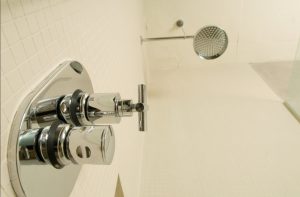
The short answer is yes, but the shower would be taken in hard water and you may want to wait until the regeneration cycle has been completed. Why? There are a number of reasons that we will cover in more detail here.
What is a Regeneration Cycle?
An ion-exchange water softener uses charged resin media to attract the dissolved mineral ions in hard water. As the mineral ions approach the media an ion exchange takes place and salt ions are exchanged as the mineral ions stick to the media. Over time, the mineral ions will cover more resin media surface and the efficiency degrades. During the regeneration cycle, the resin media tanks are flushed with a brine solution. This cleans the resin media and it recharges the media to prepare it for future ion exchanges.
When Does a Regeneration Cycle Occur?
It depends on the type of water softener system that you’re using. The regeneration cycle is triggered by a control valve using a time or demand-initiated system. Older water softeners tend to have a time-initiated system that triggers at a preset time. A newer demand-initiated system takes place when a certain volume of water has been consumed. A demand-initiated system is more efficient, it uses less salt and water and it can save the user a lot of money over the lifespan of the system. Both systems are usually set to regenerate at night when the demand for soft water is low.
What Happens if I Take a Shower During Regeneration?
When the water softener is running, a regeneration cycle of the system is placed into a bypass mode. Until the cycle has been completed, there will be a supply of hard water to meet any emergency needs. This has a few consequences if you arise during the night to take a shower. First, you may notice a drop in water pressure that may ruin your showering experience. Next, because you’re showering in hard water, you will notice the same lack of water quality that you experienced before you installed a water softener. Some of the water quality issues include dry skin, a lack of soap suds, tangled hair, and more. Another problem is that hard water directed into the water heater will contribute to the formation of scale on heating elements. Over time, this will increase the heating times and decrease the useful lifespan of this critical appliance.
What Should I Do?
If you are regularly taking a shower when the water softener is regenerating, it’s time to contact your local water treatment specialist. A technician can reset the control valve to ensure that you have soft water to meet your showering needs. If you have an older demand-initiated water softener, it may be time to consider an upgrade to a newer system. The performance and efficiency improvements will help you to recoup your investment in new equipment faster than you may imagine.
If you’re concerned about the performance of your water softener, contact your local water treatment specialist.
